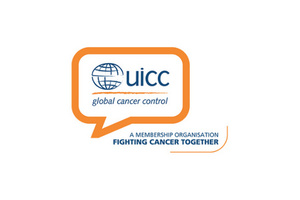From deficit to profit
Success achieved
How a new congress design, a new sponsorship campaign, increase in delegate numbers and meticulous cost control monitoring, made UICC’s World Cancer Congress profitable.Project team
The UICC Congress Team (2 team members) managed all operations from Geneva, with the tremendeous support of the rest of UICC’s Team and UICC Board members.
Introduction
As the World Cancer Congress, a UICC flagship event since 1933 started showing evident signs of fatigue and a lack of purpose, a sharp turn was taken to reposition the event. A unique product was developed that now aspires to be recognised by the global cancer community as the world’s leading conference in cancer implementation science.
In re-designing the World Cancer Congress, a number of overarching principles had to be followed:
- Convene and engage UICC members and partners
- Educate, strengthen and exchange knowledge to support UICC purpose
- Generate a small profit to support UICC activities
- Build for the future: attract more funds, new members and partners, identify and develop future leaders
- Improve the position, visibility and UICC purpose
Ambitious targets were set, such as increasing delegate numbers, raising more sponsorship funds and ensuring meticulous costs control.
Another focus was to refresh the programme by developing a dynamic and engaging offer for the targeted audience. The success of the conference enabled to increase delegates and stakeholders’ satisfaction and ensure a wider impact. All of which have helped to strengthen UICC’s position and purpose and therefore help UICC’s membership worldwide.
Discovery
As UICC underwent a restructuration with its new CEO appointed late 2009, the Congress team was reduced from 5 full time staff working in the events team (and a prominent role given to a PCO managing certain operations) to only 2 full-time staff. This also led to reducing the intervention from external entities (i.e. since 2011, PCOs were only contracted to manage administrative heavy tasks such as abstracts submissions, hotel reservations and registrations) and increasing collaboration across all teams at UICC. A greater engagement from UICC members and partners was heavily encouraged.
The World Cancer Congress took a real shift since its 2010 event in China, with a first success in 2012 in Montréal, which comforted UICC and its Board of Directors that the event was heading in the right direction.
In 2014, the World Cancer Congress proved to be a real success at all levels. It has been an incredible adventure to turn this long-standing event around, with a core team of 2 people, to bring the World Cancer Congress to such a high standard. Having gained considerable momentum, the core team is currently composed of 4 people, with great aspirations for the 2016 event in Paris, where we are hoping to welcome 3500 delegates and have a real impact worldwide. The success would not be possible without the unbelievable energy of the whole team at UICC led by a truly inspiring leader, Dr. Cary Adams, and a very supportive and dynamic Board of Directors and dedicated Committee members.
Objectives
Some of the key objectives were to refresh and re-purpose the World Cancer Congress so it would be better aligned with UICC’s strategy and mission. Part of the process included designing a uniquely positioned conference in the market, which would place the conference as a “must- attend” event for the global cancer community, increase delegates’ satisfaction, and generate a small profit to support UICC’s activities.
Activities
A segmented promotional campaign primarily focused on CEOs was developed.
First we looked at our existing Congress audience, our membership, our partners and
our networks. Then we targeted the groups that had the largest number of individuals and the highest probability ratio to attend the event. This gave us an “attractiveness score” which enabled us to rank them in terms of priority target market. We then developed a set of “motivational factors” for each segment, benefits for them to attend and a tailored marketing approach to reach out to them.
The conference was positioned as a good return on investment, highlighting the opportunities to connect, exchange best practices, learn about new evidence based initiatives, and proved to be an opportune platform to bring their employees as part of their development.
A strategy of targeted messaging was put together, highlighting areas of interest for each segmented group. Promotional tactics included discounted registration rates, opening the registrations 16 months before the event, launching a special offer for larger delegations and exhibition spaces, releasing the programme early, and more.
As the Congress bidding had been revised to a fair, transparent and competitive process, the responsibilities of each party (UICC and the host organisation) were clear (including a financial contribution from the host as a right to host the event).
First we revised the bidding guidelines to establish clear roles and responsibilities between the Host organization and UICC. Then we called for bids worldwide to all of our full members. Each submitted bid was:
- First evaluated by UICC and its team
- Then a presentation was made in front of the board by each bidder
- Each bid was evaluated through an extensive set of criteria which includes about 180 scores in different areas, with a UICC minimum score to reach for each area
A recommendation is given to the Board based on the bidder with the highest scores. This enabled to run a fair, transparent bidding process where the evaluation was clear.
Therefore, for the 2014 World Cancer Congress, the Australian hosts acted as great event Ambassadors and proudly promoted the event across the Asia-Pacific region, with the support of the Melbourne Convention Bureau and the Victoria Department of Health.
The programme was refreshed and built from a global “call for session proposals”. The selected innovative sessions were consistent in reflecting cross-country and cross- sector perspectives and showed signs of interaction with the audience. New education and training initiatives were introduced and widely promoted. They proved to be vey popular and a great incentive for delegates to register and get more out of their participation.
A new tailor-made sponsorship offer was developed, including innovative features, bringing an added value to the event. Past sponsors easily renewed their participation, new members or corporate partners came on board, and UICC’s membership grew too.
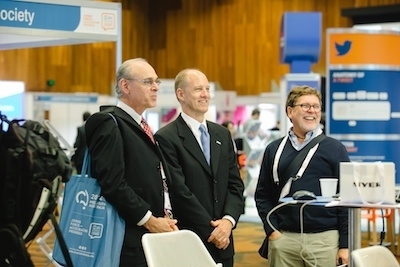
We evaluated what had worked or not in the past, what was popular, what partners were looking for in their event’s engagement, which helped us develop an offer that would fit different sponsor’s profile. Sponsorship items were divided into “themes” and “categories”, based on areas of interest. Each sponsor could select different sponsorship items, including space in the Global Village (exhibition) and based on the total amount spent, the sponsor would reach a certain level of sponsorship, leading to extra benefits.
Some of the sponsorship items part of the selection included features that we considered as “nice to have” in a conference and that weren’t necessarily part of the starting congress budget. Having them sponsored enabled to add new exciting features, for the sponsors to be associated to them and for the delegates.
Whilst many partners were encouraged to use the Congress as a platform to launch new initiatives, UICC also ensured to integrate and profile its activities and priorities throughout the conference week.
Marketing
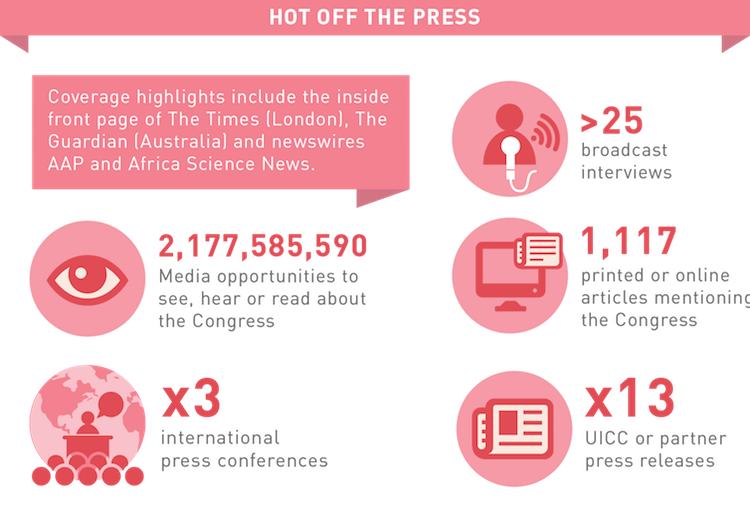
Challenges
One of the main challenges was to change UICC Members’ and partners’ perception of the event and communicate on the new event’s re-positioning. To overcome this challenge, we used a segmented promotional approach using targeted messages to boost delegate registrations. A tailor-made and more personal fundraising campaign was adopted to bring sponsors on board. Changing pre-conceived ideas and disappointing past experiences is a challenge in itself, but word of mouth is a powerful tool that we capitalized a lot on through different tactics. Having the UICC Board of Directors endorsing the change was also essential in bringing the Congress back to life.
Another challenge was to ensure the event would make a small profit and would be a major pilar for the organisation.
Achievements
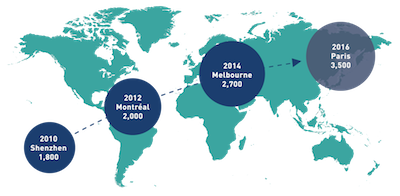
Number of attendees at the last UICC congresses
The promotional campaign brought 2700 delegates to the World Cancer Congress in Melbourne, whilst the target was set at 2500. This represents an increase of 35% in participation from the 2012 conference in Montréal, and 50% from the 2010 Shenzhen conference.
The refreshing of the programme had a huge impact on the overall quality of the conference, as well as on the general atmosphere, prone to interactions and networking. In 2010 in China, 33% of the delegates rated the conference from very good to outstanding whilst in Melbourne in 2014, it was 88% (and 76% in Montréal), so an increase of 55 points from China. In fact, in Melbourne, 98% of the delegates said they would recommend the Congress to a colleague. This outstanding feedback played a huge role in strengthening UICC’s role and credibility, internationally and across all sectors.
The evaluation shows that 81% rated the general atmosphere in the Global Village from very good to outstanding.
The press and media impact included 2,177,585,590 total opportunities to see, hear or read about the Congress.
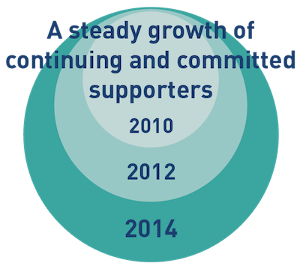
The combination of a new sponsorship campaign, increase in delegate numbers, meticulous cost control monitoring and new congress design enabled to shift the conference from a deficit of USD 300,000 in 2010 to a profit of USD 300,000 in 2014. Running a financially profitable Congress was used to gain momentum and support the rest of UICC activities and priorities.
The alignment of the Congress with UICC’s purpose and roadmap has been key to the success of the event. This was applied all the way through, in its design and new purpose, including the approach to sponsors, promotion, team work, programme and other tools used to run the events.
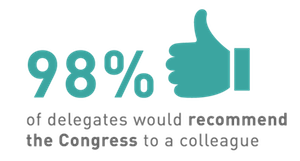
The World Cancer Congress is also held in conjunction with another UICC flagship event, the World Cancer Leaders’ Summit. The Summit is an elite advocacy forum inviting 250 decision makers and leaders in cancer control and public health. The UICC General Assembly also runs in conjunction with the World Cancer Congress. All of which is carefully promoted as an attractive offer to the UICC membership.
Success factors
Bringing stakeholders on board of a switch is key to the success of any change as their influence and support will go beyond expections. Generating a group of strong committed champions internally and externally enabled to evaluate needs, re-position and introduce new ideas effectively.
The exhibition was replaced by the “Global Village”, rated as one of the delegates’ highlights. The platform hosted organisations showcasing their activities in a space designed harmoniously, capturing the soul of a tight collaborative community rather than a commercial showroom. Some of the features included a wellness area, a cyber café, yoga classes and a photo booth linked to social media. Exhibitors organised various events from a walkabout concert, to interviews in the Media Bubble and theatre-style representations.
Online-Master Courses were offered for free to participants, starting 6-months before the event (an incentive for early registrations) and culminating in Melbourne with a workshop.
Abstracts were reviewed on an ongoing basis, which enticed authors to register early. Abstract presentations were modernised as electronic-poster presentations got introduced in dedicated theaterettes (e-pods). Other presentations were delivered in a rapid-fire style, in front of a larger audience. These changes enabled to give a speaking slot in front of an audience to 790 abstract presenters. An active role at a conference is always an incentive to participate.
The programme content and format were refreshed, introducing discussion panels, workshops, roundtables, interactive lounge sessions, and more. For example, the use of the large auditorium was maximised beyond the plenaries, with the “Big sCreen” showcasing the best TV commercials in cancer control (a competition was run), debates (with a live polling), and a closing concert.
Institutional tours to local cancer institutes and hospitals were also organised, inspiring participants.
With a longer term vision to shift to a paperless event, a smart-phone application was also developed.
Targets & Statistics

The congress in numbers
What would we do differently?
- Secure and invest in prominent drawcard keynote speakers – essential in setting the tone of an event
- Maximise networking opportunities throughout the event as encounters are powerful – do more and earlier on
- Evaluate better the impact of the Congress on delegates and feature different success stories widely
- Ensure to oversee closely the main Congress social event organised by the Host organisation to ensure it is aligned with the spirit of the Congress
- Communicate better with abstract presenters on the change of presentation formats to avoid confusion and complaints
Feedback & Testimonials
“It is very evident that interest in the World Cancer Congress is growing. I was particularly pleased by the attendance and participation in our session, which was almost at capacity. (...) With this conference, UICC has created a valuable opportunity for knowledge and ideas exchange for people to collaborate with the hope of overcoming the cancer complexities and challenges. What a great event!”
David Tremblay, Novartis Oncology (2014 WCC Gold Sponsor)
“Congratulations on an extraordinary Congress! It was so well run and with such novel ways to engage attendees, it was very different to any other conference I have attended.”
Tracey Lui, University Health Network (2014 Global Village Exhibitor)
“Our team was very impressed by the social media sessions in particular and was very surprised by the amount of tweets going through the Congress! We are still high on adrenaline from what was thoroughly inspiring and enjoyable week in Melbourne.”
Lisa Robinson, Cancer Australia (2014 WCC Gold sponsor)
“The World Cancer Congress is a one-of-a-kind opportunity for committed cancer leaders to come together from around the globe. The American Cancer Society is always so pleased to participate. We know our team will leave each Congress armed with information, enthusiasm, and connections to enable them to best tackle the challenges of our shared fight to end this disease.”
Dr. John Seffrin, President, American Cancer Society (2014 WCC Gold sponsor)
“Congratulations on the extremely successfully 2014 World Cancer Congress you organized in Melbourne. The World Cancer Congress was an unforgettable event which inspired everybody.”
Prof. Xishan Hao, Executive President, Chinese Anti-Cancer Association (2014 WCC Bronze sponsor)

